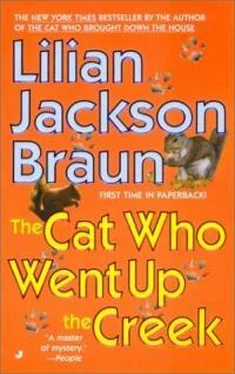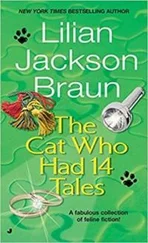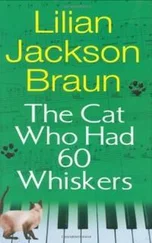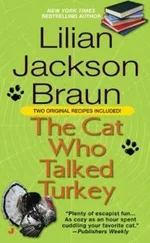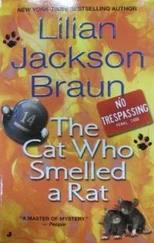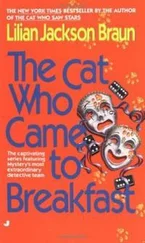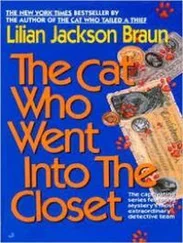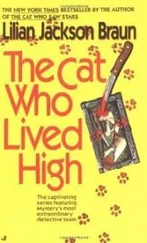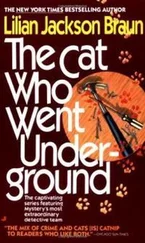On the very eve of the nuptials, however, Elsa eloped with the man she really loved, who happened to be the son of her father’s worst enemy. This was 1900, understand, when grown daughters were expected to obey their parents, no matter what! In fury her father pronounced a solemn curse on Elsa and defaced the black walnut furniture that had been made for her bridal suite. Clenching the fist that wore a large gold signet ring, he smashed it against three mirrors. For a hundred years these damaged goods have been locked up in the mansion that is now the Nutcracker Inn.
Sad to say, Elsa and her true love were among the casualties of the Great San Francisco Earthquake of 1906.
Without picking up his daily postcard, Qwilleran went to the Antique Village. He chose to bike on his Silverlight; he had had too little exercise on this trip. Playing the necktie game with the Siamese didn’t count.
He was braking at the front door, when a booming voice across the street said, “Hey, Qwill! You look good in that helmet! You should wear it all the time!”
Ernie Kemple was carrying a spinning wheel into the building. Qwilleran said, “I’ll hold the door for you, if you’ll let me park my Silverlight in the office.”
Inside, dealers were bustling about; Janelle was trying to be everywhere at once; a pleasant woman was introduced as Mrs. Munroe, Ernie’s partner; and the man who built recycled furniture had found a stone balustrade to protect the exhibit platform.
Qwilleran said, “I’m a little late with this copy for your handout, but the print shop in Pickax will give you one-day service.”
“I’ll take it down there right away.”
“Better read it first.”
“Better yet, I’ll round up the girls, and you can read it to us.”
The two assistants reported to the office, and Qwilleran read the story of the millionaire pioneer, his daughter Elsa, the marriage he arranged for her, Elsa’s elopement with the son of her father’s worst enemy—and the disastrous conclusion. Janelle dabbed her eyes; Mrs. Munroe gulped a few times; Ernie shook his head sadly no doubt thinking of his own daughter . . . Then he took the copy and left for Pickax.
Qwilleran used the phone to make arrangements for delivering the historic furniture, then said he would like to browse around for awhile. One booth had a cross-cut saw six feet long, with a handle on each end and murderous two-inch teeth. A similar one had hung on the wall in the log cabin he inherited, but it looked too threatening; he had disposed of it.
The dealer said, “This saw represents the early history of Moose County. With a Paul Bunyan on each end of it, who knows how many million trees it cut down? I can close my eyes and hear the rhythmic grinding of those sharp teeth through the trunk of a great oak! It was a sign of man’s determination to make a life for himself and his family! . . . Today I hear the whine of a chain saw, and it chills my blood. Another nail in the coffin of Planet Earth!”
“Cuckoo! Cuckoo!” That bird was always butting into every conversation, but it reminded Qwilleran it was time to go home for lunch. He asked the dealer for his card.
alt="[image]"/>By the time he showered and dressed and walked up the hill to the inn, it was two o’clock. Nick handed him a postcard and said, “We’re moving the furniture tonight. I’m going along to make sure they baby it.”
The picture on the card was that of Independence Hall, and Qwilleran wondered, What’s she doing in Philadelphia? But after he was seated at a table, where he could read the fine print, he realized that it was the Henry Ford Museum in Dearborn, Michigan.
Dear Qwill—What a museum! Everything from Georgian silver to locomotives! Miles of aisles! I’m doing it in a wheelchair. Walter sends regards.
Love, Polly
“Same to you, Walter old boy,” he said to the postcard.
In the foyer a signboard announcing coming events reminded him that the MCCC luncheon was scheduled for the next day. He had considered a limerick, as suggested by Mildred, with rhymes like academic, polemic, endemic, systemic—but found them too stuffy.
He took a window table in the dining room and watched the squirrels flicking their tails in a secret language; no wonder they were called flickertails in some parts of the country. As he waited for his ham and eggs, he formulated his plans:
He would ask the management to put a bag of peanuts at each place—with his business card, which read “Straight from the Qwill Pen” and, in smaller print, “Every Tuesday and Friday in the Moose County Something. ” When introduced at the luncheon, he would explain, soberly, that the goobers ushered in the annual “nutty season” in the “Qwill Pen” column. The kickoff would be a limerick contest, the nuttier the better. He would recite an example: “Our squirrels are as smart as can be / Alumni of MCCC / They went to college / in search of knowledge / and to learn how to run up a tree.” Then he would sit down, amid laughter and thunderous applause—or grim silence, as the case might be.
He enjoyed the ham and eggs and had three cups of coffee and walked down the hill with satisfaction, unaware of the complications that awaited him.
When he reached the creek there was singing and childish laughter coming from Cabin One.
Cabin Two was dark and silent except for a flickering blue light and the senseless noise of a television set that no one is watching.
There was no music coming from Cabin Three, but Wendy came off the porch to greet him, though not with any enthusiasm. “How’s everything going?” he asked. “Did you get your reservations at the Grand Hotel?”
She nodded absently and looked at her watch. “My mother arranged it.”
“Did Doyle finish his printing for the Chicago junket?”
“Not quite. He’s supposed to meet Bushy at the photo lab at five o’clock to coordinate their samples. Meanwhile, as you can guess, he’s gone canoeing. I slept late, and he left me a note.”
“Did he take his camera?”
She gave a humorless laugh. “Of course! Just in case something special swims by or flies over. But he promised he wouldn’t go into the woods.”
“Good!” Qwilleran murmured without conviction. “Don’t leave without giving me your home address; I’ll send you tearsheets of the dump-truck story.”
Two gunshots shattered the quiet. “What’s that?” Wendy asked sharply.
“Rabbit hunters. Some local families live on rabbit meat; it’s all they can afford.”
She kept looking at her watch. “What time do you have?” She asked finally.
“Three-forty-five.”
“Doyle’s meeting Bushy at five o’clock, and when he comes in from canoeing, he always likes to shower and change clothing. He said on his note that he’d be home at three o’clock. . . . Now I’m going to start worrying again.”
“Wendy, you can’t go through life worrying,” he remonstrated. “We live in an age when there are sudden fatalities on the freeway and madmen with guns in the supermarket—” He winced as he heard an ominous howl from Cabin Five. It started as a growl and ended in a shriek that chilled the blood. It was Koko’s death howl, and he was never wrong.
“Excuse me,” he said. “Koko’s letting me know something’s amiss.”
He ran to the cabin and phoned the inn, tracking Nick down in the basement.
“Nick, can you drop everything and come down here? Doyle Underhill hasn’t returned from canoeing, and I have reason to believe he’s in trouble. Could you and I take an outboard upstream? . . . Bring your cell phone.”
Then he phoned Cabin One. “Hannah, are you busy? Doyle hasn’t returned from canoeing, and he’s late for an important appointment. It doesn’t look good. Nick Bamba and I are going up the creek to investigate. Could you go over to reassure Wendy? She’s getting nervous. But don’t let her know that we think it’s serious.”
Читать дальше
